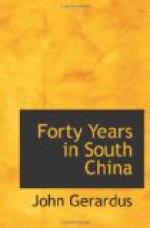He early became the judge and counselor among his brothers and sisters. In any little dispute which arose, John’s verdict was usually accepted as correct and final.
During all his missionary career in China, he was an adviser and arbitrator whom foreigners and Chinese alike sought and from whose advice they were not quick to turn away.
In the midst of the tumult among the men of Medina when they met to elect a chief to take the place of Mohammed, who had passed away, the voice of Hohab was heard crying out, “Attend to me, attend to me, for I am the well-rubbed Palm-stem.” The figure Hobab used represented a palm-trunk left for the beasts to come and rub themselves upon. It was a metaphor for a person much resorted to for counsel. John Talmage never called attention to himself, but the Arab chief must have counseled many, and well, to have taken a higher place than did this messenger of Christ at Amoy.
By the time John Talmage’s school days at Bound Brook were completed he had determined to prepare for college. Preparatory schools then were few and far away. They were expensive. John made an arrangement with his senior brother, Rev. James R. Talmage, then pastor at Blawenburgh, New Jersey, to put him through the required course. Here he joined the Church at the age of seventeen. From Blawenburgh his brother Goyn and he went to New Brunswick, New Jersey, joining the Sophomore class in Rutgers College. John and Goyn roomed together, swept and garnished their own quarters and did their own cooking. Father Talmage would come down every week or two with provisions from the farm, to replenish the ever-recipient larder. Both John and Goyn were diligent students and graduated with honorable recognition from Rutgers College in 1842, and from New Brunswick Theological Seminary in 1845.
John Talmage had made such substantial attainments in Hebrew and Greek, that when some years afterward the distinguished Dr. McClelland resigned as professor of these languages in the Theological Seminary at New Brunswick, he was talked of as Dr. McClelland’s successor, and but for the conviction that he ought not to be removed from the Amoy Mission, his appointment would have been earnestly advocated by the General Synod.
John Talmage had read missionary biographies when a boy in the Sunday-school at Bound Brook. He had been specially touched by the life of Henry Martyn. While at college he kept himself supplied with missionary literature. His parents were already interested in foreign missions. In secret before God his mother had devoted John to this very work. John did not know it. The determining word for him was that spoken in a missionary address, by Rev. Elihu Doty, one of the pioneers of the Amoy Mission. It was plain that he must go to the “regions beyond.” He must break the news to his mother. John’s love of missionary literature and his eager attendance upon missionary meetings had filled the family with a secret fear that he thought




